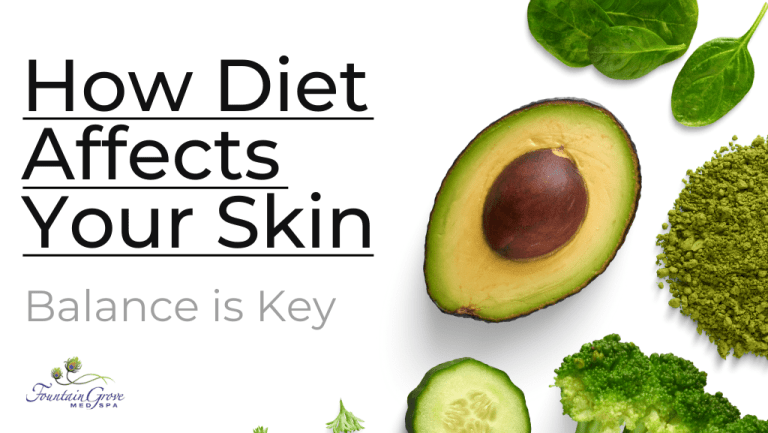
Discover the secret to achieving radiant and healthy skin by focusing on your diet. It may surprise you to learn that what you eat has a significant impact on the appearance and overall health of your skin. Say goodbye to acne breakouts and premature aging caused by poor dietary choices, and say hello to a glowing complexion. By incorporating specific foods into your daily meals, such as fresh fruits and vegetables, fish, and nuts and seeds, you can nourish your skin from the inside out. Not only will you see improvements in your skin’s texture and tone, but you’ll also experience increased energy and overall well-being. Get ready to transform your skin health with the power of nutrition.

Introduction
If you’re like most people, you probably spend a lot of time worrying about your skin and how to keep it looking healthy. While there are many ways to do this, the best way is by eating healthy foods that promote good skin health. The key to having beautiful skin is in what you eat! Your skin is the largest organ in your body, and protecting it from outside pollutants and chemicals can be a challenge. But what you eat each day makes an even bigger difference. A diet high in sugar and processed foods can lead to inflammation, acne breakouts, and premature aging of the skin. So how does what you eat affect your skin? In this article, we will explore the fascinating connection between diet and skin health and provide practical steps for improving your skin through dietary changes.
Gut-skin axis
Did you know that there is a strong connection between your gut and your skin? It’s called the gut-skin axis, and it’s a complex network of communication between your digestive system and your skin. The health of your gut can have a direct impact on the appearance and health of your skin. When your gut is functioning properly, it can process nutrients efficiently and eliminate toxins effectively, resulting in clear and radiant skin. On the other hand, an unhealthy gut can lead to inflammation, which can manifest as acne, redness, and other skin issues. Taking care of your gut health through a balanced diet is essential for maintaining beautiful skin.
The Role of Sugar in Skin Health
One of the biggest culprits when it comes to skin issues is sugar. Consuming excessive amounts of sugar can wreak havoc on your skin. When you consume sugar, it triggers a process called glycation, which causes sugar molecules to bind to collagen and elastin in your skin. This process leads to the formation of advanced glycation end products (AGEs), which contribute to the breakdown of collagen and elastin fibers. In simple terms, high sugar intake can accelerate the aging process and lead to the development of wrinkles and sagging skin.
Effects of Sugar on Inflammation
In addition to its impact on aging, sugar also plays a significant role in inflammation, which is a common factor in skin conditions like acne, rosacea, and eczema. When you consume sugary foods, it causes a spike in your blood sugar levels, leading to increased production of insulin. This insulin spike triggers the release of inflammatory mediators in your body, which can result in skin inflammation. Inflammation can manifest as redness, swelling, and acne breakouts. By reducing your sugar intake, you can help mitigate inflammation and improve the overall health and appearance of your skin.

Impact of Sugar on Acne
Acne is a common skin condition that affects people of all ages. While there are several factors that contribute to acne development, diet, and particularly sugar intake, plays a significant role. Studies have shown that high-glycemic foods, such as sugary drinks, white bread, and sweets, can increase the production of sebum, a type of oil that can clog pores and lead to acne breakouts. Additionally, a diet high in sugar can disrupt the balance of gut bacteria, leading to inflammation and an increased risk of acne development. By reducing your sugar consumption and opting for a balanced and low-glycemic diet, you can help prevent and manage acne.
Hydration and Its Importance for Skin Health
While what you eat is essential for maintaining healthy skin, hydration is equally crucial. Drinking an adequate amount of water each day is vital for keeping your skin hydrated and maintaining its elasticity and suppleness. When your body is dehydrated, your skin can become dry, flaky, and prone to wrinkles. Water is essential for flushing out toxins from your body and promoting healthy cell turnover, which is crucial for maintaining a vibrant complexion. Make sure to drink at least eight glasses of water a day and include hydrating foods like watermelon, cucumber, and leafy greens in your diet to keep your skin glowing from within.
Personal Stories on Dietary Changes and Skin Improvement
Sometimes, the best way to understand the impact of diet on skin health is through personal stories. Many individuals have experienced significant improvements in their skin by making dietary changes. In fact, cutting out sugar and processed foods from their diets has been a game-changer for many. People have reported clearer skin, reduced inflammation, and a more youthful complexion after adopting a clean and balanced diet. These personal stories highlight the power of nutrition and serve as inspiration for those who are looking to improve their own skin health through dietary changes.
Expert Opinions on the Diet-Skin Connection
While personal stories are compelling, it’s also essential to consider expert opinions when exploring the diet-skin connection. Dermatologists and nutritionists agree that there is a strong correlation between what we eat and the health of our skin. They emphasize the importance of consuming a nutrient-rich diet that includes fruits, vegetables, lean proteins, and healthy fats. Experts also recommend avoiding processed foods, excessive sugar, and high-glycemic carbohydrates to maintain optimal skin health. By nourishing your body with the right nutrients, you can support your skin’s natural functions and promote a clear and radiant complexion.

Conclusion
Your diet has a significant impact on the health and appearance of your skin. By making conscious choices and opting for nutrient-dense foods, you can promote a radiant complexion and delay the signs of aging. Avoiding excessive sugar and processed foods is key to reducing inflammation and preventing skin issues like acne. Additionally, staying hydrated is vital for maintaining skin elasticity and overall skin health. So take a moment to assess your dietary habits and make small changes that can have a profound impact on your skin. Your skin will thank you for it!
How to Start: Practical Steps for Improving Skin Health through Diet
Ready to start improving your skin health through diet? Here are some practical steps you can take:
-
Reduce your sugar intake: Start by cutting back on sugary drinks, sweets, and processed snacks. Opt for healthier alternatives like fresh fruits when you’re craving something sweet.
-
Eat a balanced diet: Incorporate a variety of nutrient-dense foods into your meals, including fruits, vegetables, lean proteins, and whole grains. Aim to fill half of your plate with colorful fruits and vegetables.
-
Hydrate properly: Make sure to drink at least eight glasses of water a day. You can also incorporate hydrating foods like watermelon, cucumber, and leafy greens into your diet.
-
Limit processed foods: Processed foods are often high in sugar, unhealthy fats, and additives that can negatively impact your skin. Focus on whole, unprocessed foods for better skin health.
-
Experiment with elimination diets: If you suspect that certain foods may be triggering skin issues, consider trying an elimination diet. This involves temporarily removing potential trigger foods from your diet and gradually reintroducing them to identify any reactions.
Remember, consistency is key when it comes to improving your skin health through diet. Stick to these healthy habits, and over time, you’ll notice the positive changes in your skin.









Thanks for sharing. I read many of your blog posts, cool, your blog is very good.